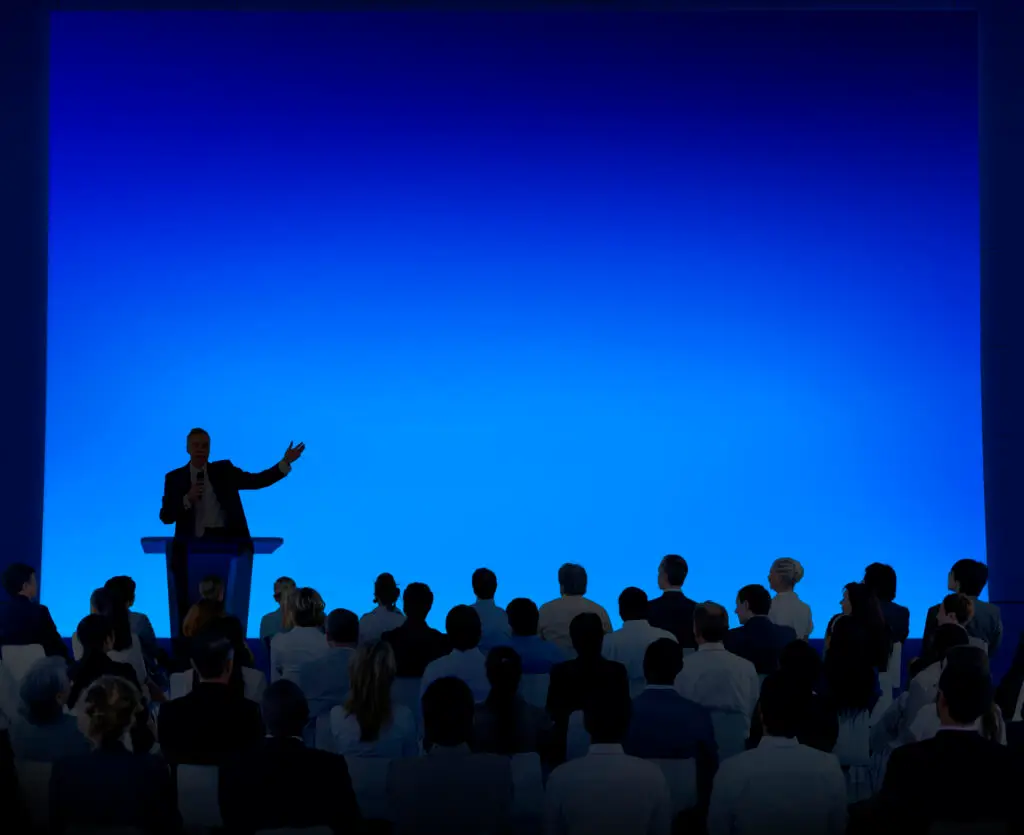Meet the Boostlingo Events English to French conference interpreter and industry leader using his decades of experience to power exceptional simultaneous interpretation.
Each month at Boostlingo we feature one of the interpreters who make our work possible. This month, we’re featuring our first Boostlingo Events interpreter to introduce you to the simultaneous interpreting side of the interpretation world.
Paul Appleyard is an award-winning English to French conference interpreter, Co-Owner of interpreting, translating and localization company Manazana Business Solutions Limited, and former Chair and Vice-Chair of the world-renowned Institute of Translating & Interpreting. In 2019, Paul was awarded the Interpreting Assessment Award by ITI.
Paul has worked in the language space for more than 30 years and began his career in translation for the emerging computer and technology industry. In 2003, he made the move into full-time entrepreneurship and has been running Manzana for the last 20 years.
What was the transition from full-time employee to full-time freelancer and then entrepreneur like for you? What do you think helped you succeed for the last twenty years?
I was quite lucky in that I had always worked for American companies back in the olden days, so I had never had really a UK nine to five. My working hours were effectively Bermuda time. So, I didn’t have the shock of having to fit things into a different timetable. And I also had the advantage of knowing people who worked in the translation sector already.
I mean, the biggest shock, obviously, is that you don’t have an income. That’s a bit of a surprise. But it’s about your mindset, it’s about your approach as well.
Today, one of the things people talk about when they’re talking about applying for jobs, and applying for any position is don’t use words like “passionate.” But, you know, I’m passionate about my job.
I’ve lived and breathed and thought linguistics in one way or another ever since ever since school, right through university, and then out into the world. Moving into what I’m doing now — I was almost always going to do it, there was almost absolutely no chance at all that I wouldn’t have done it at some point. It was almost a case of when I would do it rather than whether. So, it was an easy move for me.
Part of it was the luck that I have got a lot of computer experience. I had worked in a sector which is very, very dynamic [Localization for tech companies]. From a business point of view, working in the IT sector was an absolutely perfect training space for the business side of things. And for the in-depth knowledge of the computing side of things.
Otherwise, generally, across the whole interpretation sector, you have things you can do and you have things you definitely can’t do. For instance, I would never do medical. I don’t think I’ve ever done medical. I wouldn’t do courts and police interpreting which is a very specialized area.
But within the business sector, if you’re working with a company selling cars, at companies selling watches, at a company selling mobile phones—they’re all going to have the same challenges.
And then, they’re all going to have their own challenges, and they’re also going to have their own specific knowledge. Working in the computer sector gives you training in how to research and look into things in great detail. If you’re looking at watches, for example, then you’ll need to learn the terminology that goes into the wheels and the springs and the spigots and all the other stuff that goes into those.
But if you’re used to studying and you’re used to learning, you can do that for the space in which you’re working, then you can forget it a week later. But having had my particular background, which did have a lot of detailed work, it gave me the opportunity to continue to do that work in other ways. If you’re used to looking into things and you’re used to looking and researching things, then it’s almost the perfect job for you.
You’re a well-known advocate and teacher in the area of professional development for interpreters. Tell us your advice for those who are trying to grow their careers.
Well, the short answer is talk to people, and then talk to more people. And then after you’ve spoken to people go and talk to somebody else.
Depending on exactly where you are on your journey, if you’re right back at the beginning, the linguistic train hasn’t even arrived in the station yet, start to talk to your local language associations, your translation associations, your interpreter associations. In the UK, we have a number of translation and interpretation organizations, obviously the Institute of Translation and Interpreting (IT), which I’m going to mention, because I was part of their board for a while. There’s the Chartered Institute of Linguists.
But then there are also specialist bodies, such as the National Register of Public Service Interpreters, who will work specifically with people in the public service space. So right at the beginning of your career, talk to people, find them on LinkedIn and ask them questions.
Join something like ITI, again, because here we’ve got lots of subject groups, language groups, and there are groups that help interpreters’ development that.
Go to meetings and you’ll hear people who’ve just started out, you’ll hear people who’ve been doing it for years, talking to you. Now you get to meet people, you get to talk to people in real life. And those are connections that having once made those connections, those connections are there.
So, then you might be talking to somebody who says,” Oh, I’m looking for a German interpreter who could interpret about pens.” And you’ll say, “I was just talking to Gertrude last night at this conference. And she’s your real expert on how to put the cap on a pen.” But you’ll remember them much more if you’ve met them in real life. And you build those links, and those links stay with you.
What is your favorite part of being an English to French interpreter?
One of the things I’ve said in the past is that working in this sector keeps people young. I haven’t been 22 years old for a couple of years at least.
I’ve just got an assignment in a few days time, which is going to be looking at water treatment. And because of that particular assignment, I’m spending a couple of days looking at water and the way you filter it and all the stuff that goes into that.
So, you’re continually learning. And I think that if you enjoy continually learning and you enjoy continually researching things, this is the perfect job for you. And it keeps you young because your brain doesn’t have time to slow down.
I spend time with other people who aren’t necessarily the same people every time. And that keeps me young. Because you don’t atrophy. I compare myself to people who I was at university with. They’re obviously great friends—in some cases, I’ve known them for decades. But conversation start to move around to things like retirement and slowing down and things like that.
I don’t want to do any of that. If I could get into a time machine and go back and talk to me back in the 1980s [when I was just starting out], I don’t think I would tell myself to make too many changes. You know, I’m still happy to keep going. And I still feel as much enthusiasm, vim, vigor, and whatever else, as I had probably back in the last century.



